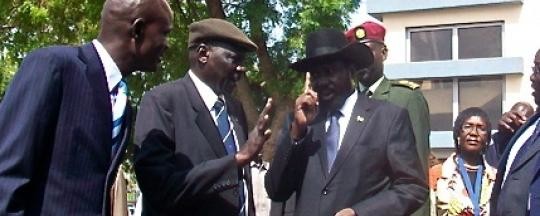South Sudan’s government aims to control rising commodity prices by providing dollars to government-linked importers at a preferential rate while forcing others to reduce their sale prices, the spokesman of the government announced yesterday after a cabinet meeting.
Minister of Information and Broadcasting Michael Makuei Lueth said that in the next few weeks the government will start fixing commodity prices in the market. This comes after President Salva Kiir listened to a report of an economic committee formed early in May.
Speaking to press after yesterday’s cabinet meeting, Makuei said, “It is worth mentioning the economic crisis committee has already allocated 10 million (dollars) to Alpha Bank and Ivory Bank for the purchase of food items that will be arriving in Juba. This process has already taken place and we expect within the next coming few days that food items would be brought to Juba – different food items which has already been identified and this will mark actually the beginning of the price control.”
He continued, “Because there is no way we would give out money to the business people at the official rate and then they are brought here, they come and sell them at the black market rate, as if they bought them at the black market rate. So with the coming of these goods there will be maximum control and prices will be fixed and controlled so that we see exactly where things go wrong.”
The minister did not indicate how the government will try to stop people from selling commodities at market rates nor which government organ would set the maximum allowable prices.
Makuei added that Alpha Bank is opening a credit line putting in 40 million dollars for the purchase of food items and non-food items including fuel. He added that the issue of fuel will be addressed saying the country would be receiving two million litres of fuel daily for seven to ten days to finally solve the fuel crisis.
He did not say anything specifically about the fixed exchange rate for the dollar, whereby the central bank forbids forex bureaus and banks from selling dollars at more than 3 to 1, which discourages them from making dollars available to importers because the street rate for dollars is more than five times that rate.
However, he noted, “The minister of finance and the governor of the central bank have been directed to sit down and come up with a clear plan on how the current situation can be addressed.”
Meanwhile, the ministry of education has reported that contractors for public universities and national secondary school have not been paid. “It was a concern and the minister of finance was directed to resolve that situation,’’ the minister said.
Makuei blamed the war for the current economic situation saying with more time of peace the economy will improve.
Related coverage:
Kiir defends dollar rationing but admits corruption at central bank (9 July)
Son of central bank governor involved in currency trading in Juba (7 July)
List of South Sudanese companies accessing dollars at preferential rate (23 June)
Officials profiting from South Sudan dollar shortage (3 May)




